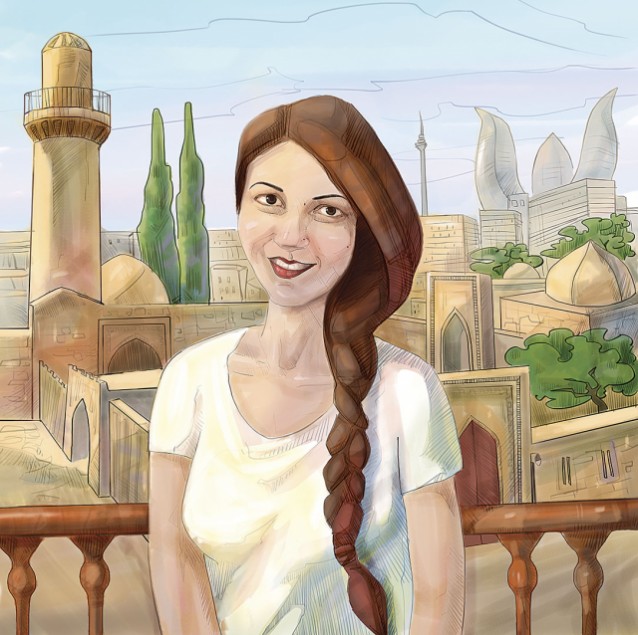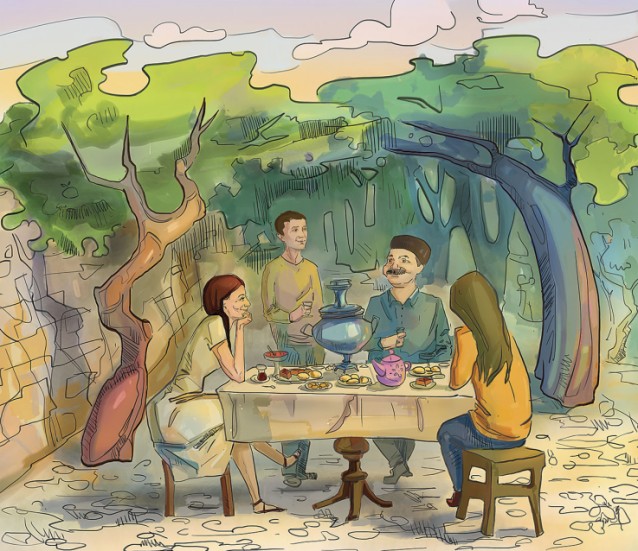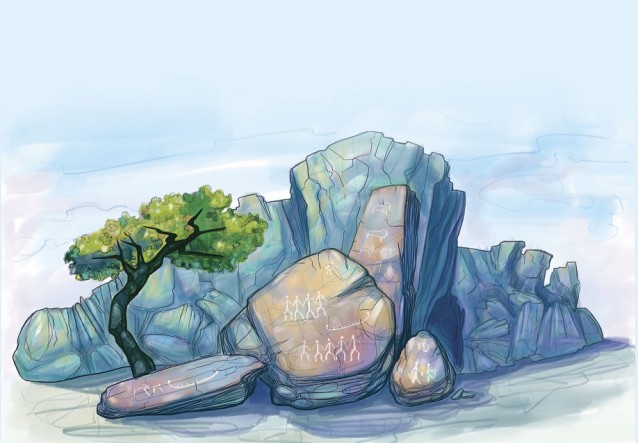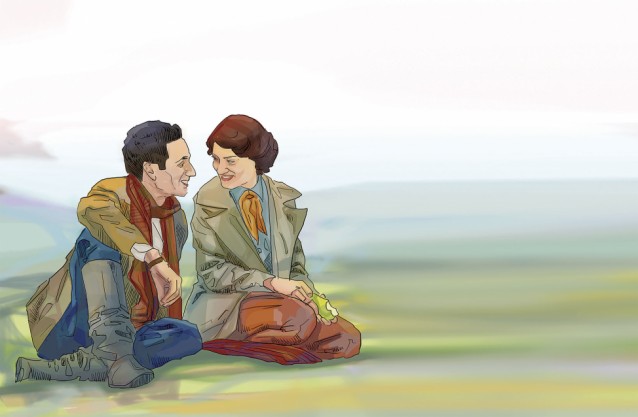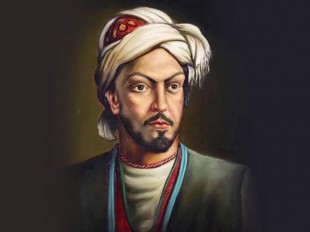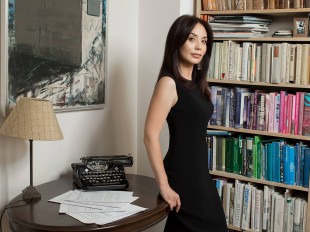Following the recent release of a film adaptation of Kurban Said’s classic novel Ali and Nino, Bulgarian student of Turkology Jeannette Nikolova discusses the significance of the book and her passion for all things Azerbaijan.
There is a certain list of places which people could spend a lifetime being only vaguely aware of. And a lot of the time that would be a big mistake. This is true about Azerbaijan more than any other place. Azerbaijan – a country about which there is so much to be said, and yet, so little is known.
One of the hardest questions that we could ask ourselves, or each other, about love or passion is: When did it start? When did my love for Azerbaijan develop? To answer this, I would have to rewind the last couple of years. But worry not, I do have an answer to this question.
Discovering Azerbaijan
In 2012 I started what would become a great journey – a bachelor’s degree in Turkology. Little did I know that instead of Turkey, the centrepiece of my studies, I would find another country that would steal my heart…
Two years into my studies I decided to take up another Turkic language. I met with the teacher of the Azerbaijani language course, a woman who would later become much more than a teacher – a friend, and I signed myself up for a two-year course in Azerbaijani language, literature and culture. As with any class, be it at school or university, at first I wasn’t sure what this would amount to, or what I would gain from it. I did my lessons, learned sounds, words, sentences and texts. I read, watched movies, looked at pictures, and dreamed of how one day I would go to this unknown, mysterious, and enchanting place.
What I didn’t know back in 2013 was that one year later, at the end of November 2014, I would start a journey which would change me forever. In fact, it was during this journey - after a brief visit to the pearl of Turkey, Istanbul, almost missing our flight to Tbilisi, a much more challenging, and yet fascinating place than imagined; after a 20-hour-ride on a bus full of stolen goods, with people of questionable values; after being stranded on the Georgian border for 10 hours; and finally, after finding myself, along with my two fellow adventurers, in the middle of a very cold night, on the Azerbaijani side of the border - that I realised that this is a place I wouldn’t forget. That was the moment it started.
And from here, I will take this story step by step, so that those who are reading this but don’t know Azerbaijan, will begin to realise, and those who do know Azerbaijan, will begin to understand, why this country should forever be erased from the list of places people never learn enough about.
My friends and I were sitting on the border, wondering and worrying about whether our bus would come for us, or whether we would have to get on one of the numerous shuttle buses offering rides to the opposite side of the country, to Baku. Our bus did come and off we went, excited and exhilarated, impatient to finally see the place we had heard so much about.
Almost a day later, we found ourselves settled in a dormitory in Baku, belonging to Baku Slavic University, where we were going to be studying Azerbaijani language for nearly a month. This would be the starting point of an adventure of a lifetime. Because it took me a month. A month to see, to live, to taste, to experience, and, finally, to know. To know what? You would ask. To know that there wouldn’t be a gust of wind that wouldn’t remind me of Baku, that the tea would never get better than the tea in Azerbaijan, that Europe and Asia can balance perfectly, that I would find my favourite cheese in a little store and would never forget it, that in Baku even at 2am the streets are full of people, that I would find a new home half a world away.
This is what you won’t read about Azerbaijan in books, what you won’t learn from the news, what no TV presenter will mention: Azerbaijan is a place where worlds, cultures, cuisines, fashions even, collide, and do so beautifully.
If you went to Baku, the first thing that you would see would probably be the Flame Towers, rising on the highest point of the Baku horizon. You could visit the Alley of Martyrs, take a funicular down the hill, and enjoy a leisurely stroll around little Venice, the Carpet Museum, maybe walk all the way down to Flag Square, or if you were in the mood for shopping, go in the other direction, and visit the Park Bulvar shopping centre. You could walk up Nizami street, or the so-called “Targovaya.” Maybe go take a bite to eat at one of the amazing underground restaurants of Baku, or look at the beautiful, illuminated fountains. A place you would never miss seeing would be the old town, Icherisheher, with the Maiden Tower and the palace of the Shirvanshah dynasty.
On the other hand, if you decided to take a bigger tour of Azerbaijan, I would guess that, just like I did, you would see Nizami’s tomb in Ganja, the petroglyphs of Qobustan, the church in Kish, the palace of the Sheki Khans, the temple of Ateshgah. Or if you were up for modern adventures, you might go to the black beaches of Nabran, or the beautiful ski slopes of Qusar.
The things that would follow you everywhere would be the amazing food, the kind, welcoming people, their hospitality and care, the sweets, the meat, the incredible, unusual architecture, the nature which in such a small country presents all of its shapes and moods, from windy but warm Baku, to cold and snowy Shamakha, to the fires that never go out, and the mud-spurting volcanoes.
And there would also be so much to learn and to see. Azerbaijan is a place where you have not only all climates, but also all cultures and traditions. It is a country which has taken and developed multiculturalism to an entirely new level. A country in which all religions exist side by side, and in which you can see the heads of all religious institutions, sitting together, discussing their beliefs amongst themselves, or presenting them to other people, as I had the opportunity to experience during the Summer and Winter Schools of Multiculturalism in 2015 and 2016.
Most of all, however, you would see that this is a country in which fairytales are history, fiction is reality, culture is traditions, Europe is Asia, East is West. No other place that I have ever been to has been such a siphon of its surroundings, such a centre of values, existing in a fascinating equilibrium.
This is where I will tell you about the one place that you might not see on your adventures in Baku. And even if you saw it, you might not realise how important it is to Azerbaijani history and culture. At the beginning of the 20th century Azerbaijan became rich with oil. Or rather, small men, with a bit of luck, found themselves rich overnight, during the oil boom. Farmers became millionaires, millionaires became patrons. Two such people were the Mailov, or Mailyan brothers. As the legend goes, a beautiful Italian opera singer came to Baku, but was disappointed to see that the city did not have an opera house. The Mailov brothers, according to some, angry, according to others, ashamed, or maybe out of unrequited love, pride, or for glory, decided to build the Baku opera house. A building which stands even today, as beautiful and as glorious as ever.
The one part of this story that I didn’t mention was that the two brothers also happened to be of Armenian descent. Today, this is a hurtful, sad topic for the people of Azerbaijan. However, this story can show that Azerbaijan always was, and still is, a home of tolerance and acceptance. However history might have developed since those times, even after conflicts of military character, the Azerbaijani people never destroyed this work of art, which under their circumstances they might have. Culture, forgiveness, and kindness are core values in this small Caucasian oasis.
More than a love story
And this brings me to the last part of my story. Where culture, inspiration, history and tradition meet, you find inspiring stories. One such story I had the opportunity to read in Azerbaijani, after it was recommended to me by many friends. The story of Ali and Nino.
To call Ali and Nino a romance novel, to me, would be an underestimation of this book. Of course, it starts as one. It begins with the pure, childish affection between an Azerbaijani Shia boy and a Georgian Orthodox girl. And while those descriptions might be there in the book, yes, she is of one religion, and he – of another, they aren’t so essential to the story. If you chose to see this novel as a romance, you would probably be disappointed. If you chose to see only a romance in this story, you would probably be doing it on purpose or with ignorance, because the lives of Ali and Nino are as intertwined as the Gordian knot, and just as complicated. What starts out as a school romance, soon grows into a relationship so complicated that darkness is bound to appear. And appear it does. Blood spilled, words exchanged, honour, pride and tradition mix into a whirlwind of emotions between the two characters, forcing them to become closer to each other and grow further apart.
The description of the characters is so detailed and their personalities so intricate that we can glimpse into the darkness that they are fighting in themselves and in each other. We manage to see a side of Nino, vicious and mean, and of Ali, where he is torn between his classic values and his modern upbringing, between his desire to bring change, and his inability to bow down to powers he doesn’t respect or value.
And yet, among all of their fiery emotions, the changes, the growing up, the helplessness, and the anger, love still takes place. Just like people, it is complicated, almost twisted, sometimes ugly, but love, nevertheless:
Suddenly I felt that nothing in this world is more valuable and sacred to me than Nino’s eyes full of laughter…
However, don’t make the mistake of dismissing this book as yet another Romeo and Juliet, because the moment that you stop looking at the purely emotional side of the novel, you would see that this is a unique case study on the people of the Caucasus. And also one that would fit all tastes. Because in this book you would be able to see exactly what I mentioned earlier – the balance between values and traditions, in a country which has one foot in Europe, and one in Asia.
If you but imagined how the world looked some hundred years ago, how women’s rights were, how religion influenced people, how wars were fought, how people defended their rights, you would realise that Ali and Nino shows the history of a country that was innovative and advanced in so many unexpected ways. From the first opera houses and theatres in the Muslim world, to giving women the right to vote much earlier than in Germany and France. From the camaraderie of Christians and Muslims, to their mixed marriages, completely accepted and approved by society. Even today, the innovativeness of the Azerbaijani people a hundred years ago seems foreign and hard to achieve in the so-called civilized West.
Even if the promise of amazing food, amazing cities, fascinating history and culture didn’t make you pack a bag to Azerbaijan right now, you could just pick up Ali and Nino, and visit a world where everything would be different, foreign, and yet astonishing and beautiful.
About the author: Jeannette Nikolova is a Bulgarian Turkologist who studied at Ankara University in Turkey and has been learning about the language, history and culture of Azerbaijan for the last three years.